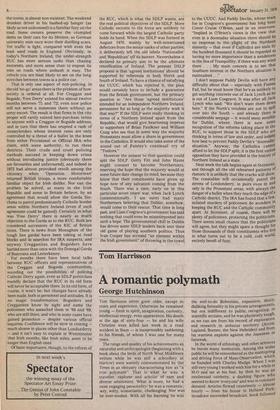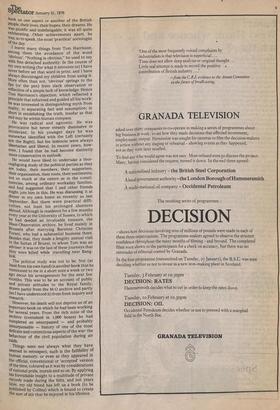Tom Harrisson
A romantic polymath
George Hutchinson
Tom Harrisson never grew older, except in years and experience. Otherwise he remained young — fresh in spirit, imagination, curiosity, intellectual energy, even appearance. His death at the age of sixty-four — he and his wife Christine were killed last week in a road accident in Siam — is inexpressibly saddening to his friends, of whom I was one for many years.
The range and quality of his achievements as naturalist and anthropologist (beginning with a book about the birds of North West Middlesex written while he was still a schoolboy at Harrow) were warmly commemorated by the Times in an obituary characterising him as "a true polymath". That is what he was; a traveller, explorer and scholar of rare and diverse attainment. What is more, he had a most engaging personality: he was a romantic, wry, witty, iconoclastic, challenging. Nor was he over-modest. With all his learning he was
the well-to-do Bohemian, expansive, saucy, disliking formality in his private arrangements, but not indifferent to public recognition or scientific acclaim; and he was physically tough, as we can see from his record of exploration and research in arduous territory (Arctic Lapland, Borneo, the New Hebrides) and from his wartime exploits against the Japanese in Sarawak. In the world of ethnology and other sciences he leaves many memorials. Among the wider public he will be remembered as the mainspring and driving force of Mass-Observation, which he founded with Charles Madge. When I was still very young !worked with him for a while in M-O and sat at his feet: by then he was an intellectual celebrity, a dashing figure who seemed to know 'everyone' and was in constant demand. Articles flowed ceaselessly — almost hourly — from his house in Holland Park, broadcast succeeded broadcast, book followed
book on one aspect or another of the British People, their lives, their hopes, their dreams. He
was prolific and indefatigable; it was all quite exhilarating. Other achievements apart, he
was, so to speak, the most 'practical' sociologist of the day. I learnt many things from Tom Harrisson,
among them the avoidance of the word 'obvious'. "Nothing is obvious," he used to say With fine detached authority. In the course of
MY own writing (for what it amounts to) I have never before set that word in print; and I have
always discouraged my children from using it. More often than not, 'obvious' springs to the lips (or the pen) from slack observation or reflection of a simple lack of knowledge. Hence
Tom Harrisson's objection, which reflected a Principle that informed and guided all his work: he was interested in distinguishing myth from reality, in separating fact and assumption; in short in establishing the truth, insofar as that end may be within human compass. He was radical and agnostic. He was provocative but never meanly dismissive or intolerant. In his younger days he was somewhat identified with the Left (certainly not the Right), but his instincts were always libertarian and liberal. In recent years, however, I found that he had become distinctly more conservative in outlook.
He would have liked to undertake a thoroughgoing study of the political parties as they are today, their members, their supporters, their organisation, their roots, their sentiments,
11°t so much at the centre as in the constituencies, among ordinary workaday families, and had suggested that I and other friends /night join him in this. He was discussing it at dinner in my own home as recently as last September. But there were practical difficulties, not least his prolonged absences abroad. Although in residence for a few months every year at the University of Sussex, to which he had deeded an invaluable treasure, the Mass-Observation archive, he lived mainly in Brussels after marrying Baronne Christine Forani, who had a substantial business there. Besides that, they made a lengthy annual visit to the Sultan of Brunei, to whom Tom was an adviser: it was on the last of these journeys that they were killed while travelling near Bangkok.
The political study was not to be. Nor (at least from his own hand) is another book that he Mentioned to me in a short note a week or two ago about his arrangements for the next few months. This was to be an account of public and Private attitudes to the Royal family, drawn partly from the M-0 archive and partly (as I have understood it) from fresh inquiry and research.
However, his death will not deprive us of an important book on which he had been working for several years. From the rich mine of the archive (contained in 1,000 boxes) he had Completed an unsurpassed — and probably unsurpassable — history of one of the most delicate and contentious aspects of the war: the
behaviour of the civil population during air raids.
Things were not always what they have seemed in retrospect, such is the fallibility of human memory, or even as they appeared in the official, conventional or 'accepted' version of the time, coloured as it was by considerations of national pride, morale and so on. By applying his formidable insight to a multitude of private
records made during the blitz, and not years later, my old friend has left us a book (to be Published by Collins) which is bound to create the sort of stir that he enjoyed in his lifetime.



























 Previous page
Previous page